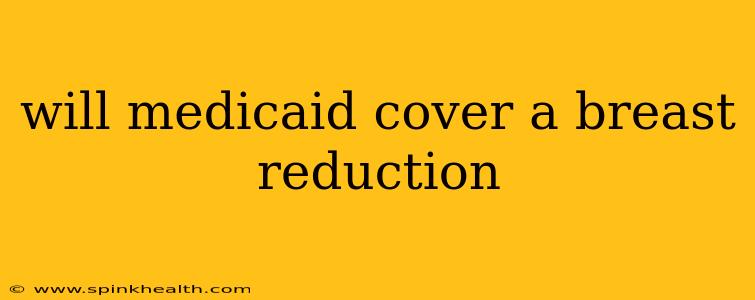Will Medicaid Cover a Breast Reduction? A Look at the Complexities
The question of whether Medicaid will cover a breast reduction is not a simple yes or no. It's a journey fraught with complexities, navigating medical necessity, individual state regulations, and the often-overlooked emotional and physical burdens carried by women considering this surgery. Let's unravel this intricate situation together.
Imagine Sarah, a young woman carrying the weight of excessively large breasts. The physical pain is relentless – backaches, neck pain, shoulder strain – impacting her daily life. She struggles with breathing difficulties and finds even simple tasks exhausting. The emotional toll is equally heavy; self-consciousness, body image issues, and a deep-seated desire for a change are consuming her. Sarah's story, though fictionalized, reflects the reality faced by many women seeking breast reduction surgery.
So, will Medicaid cover her procedure? The answer hinges on a critical factor: medical necessity. Medicaid programs, while designed to provide healthcare coverage for low-income individuals, generally only cover procedures deemed medically necessary, not cosmetic enhancements. This is where the line blurs.
What Constitutes "Medical Necessity" for a Breast Reduction?
This is the pivotal question. A breast reduction isn't simply about aesthetics; for many women, it's about alleviating significant physical and psychological distress. To qualify for Medicaid coverage, Sarah (and others in similar situations) must demonstrate that her large breasts are causing:
- Significant physical discomfort: This might include chronic back pain, neck pain, shoulder pain, headaches, skin irritation, and breathing difficulties. Doctors need comprehensive documentation – medical records, examinations, and potentially imaging tests – supporting these claims.
- Impaired physical function: Are the large breasts impacting Sarah's ability to perform everyday tasks? Can she exercise comfortably? Does it affect her sleep? This needs to be clearly outlined.
- Negative psychological impact: The emotional toll can be substantial. Depression, anxiety, and body image issues directly linked to breast size need to be documented by a mental health professional.
How Does State Variation Influence Medicaid Coverage?
Each state manages its own Medicaid program, creating a complex patchwork of coverage. While the overarching principles regarding medical necessity remain consistent, the specific criteria and documentation requirements can vary significantly. Some states may be more lenient than others in interpreting "medical necessity," leading to different outcomes for similar cases.
It's crucial to understand your state's specific Medicaid guidelines regarding breast reduction surgery. Contacting your state's Medicaid office directly or consulting with a healthcare provider well-versed in Medicaid regulations is essential.
What If Medicaid Doesn't Cover the Procedure?
If Medicaid denies coverage, it doesn't automatically mean the end of the road. Several avenues can be explored:
- Appeal the decision: Medicaid denials can often be appealed. Gather all relevant medical documentation and meticulously follow the appeals process. A strong case, well-supported by evidence, significantly increases the chances of a successful appeal.
- Explore payment options: Consider financing options, such as medical loans or payment plans, to make the procedure more affordable.
- Seek support groups: Connecting with others facing similar challenges provides emotional support and valuable information.
Does Medicaid Cover Breast Reduction for Teenagers?
Yes, in cases where excessive breast size significantly impacts the physical and psychological well-being of a teenager, Medicaid may cover the breast reduction. The same criteria of medical necessity apply, but the developmental aspects of a teen's life must also be carefully considered.
In conclusion, while Medicaid may cover a breast reduction surgery, it's conditional upon demonstrating clear medical necessity. Understanding your state’s guidelines, gathering thorough medical documentation, and meticulously documenting the physical and psychological impact of large breasts are crucial steps in navigating this complex process. The journey might be challenging, but with persistence and informed advocacy, the possibility of relief and improved quality of life can become a reality.

